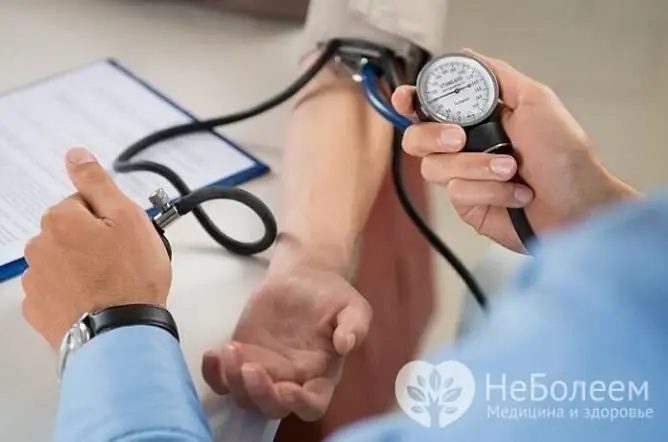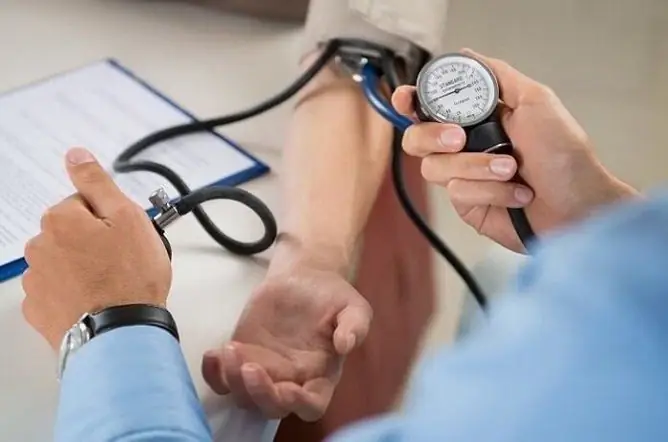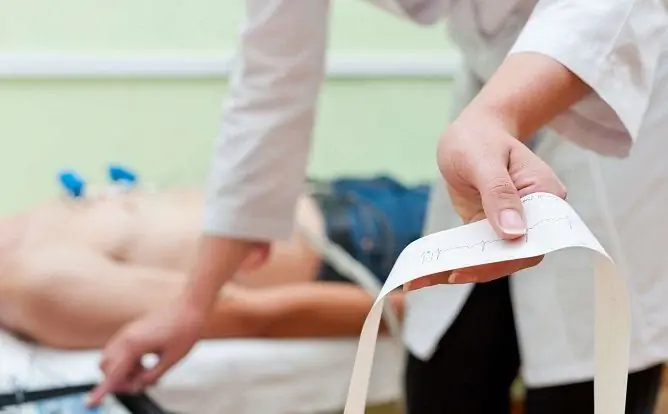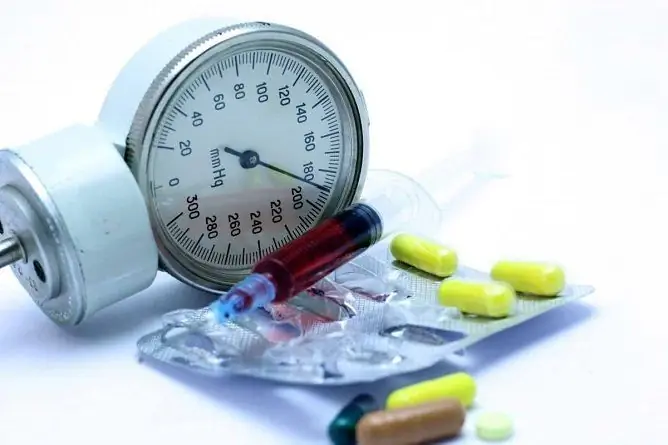- Author Rachel Wainwright wainwright@abchealthonline.com.
- Public 2023-12-15 07:39.
- Last modified 2025-11-02 20:14.
Low blood pressure and high pulse: causes, symptoms, treatment
The content of the article:
- Causes of high pulse with low blood pressure
- Symptoms of low blood pressure with a high heart rate
- What to do with high heart rate and low blood pressure
- Video
Low blood pressure and high pulse - what does it mean? This combination can be a sign of severe intoxication, severe bleeding or other pathologies, but it also occurs in a healthy state under some circumstances in both young and elderly patients.
The main indicators that make it possible to assess the work of the human cardiovascular system include blood pressure (BP) and heart rate. Distinguish between systolic (upper) and diastolic (lower) pressure. Usually arterial hypotension (hypotension) is considered to be a decrease in blood pressure below 90/60 mm Hg. Art.
Tachycardia (high heart rate) is an acceleration of the heart rate in an adult to 90 beats per minute or more.

Low blood pressure with high heart rate may require emergency medical attention
Usually, at first, the patient's pressure decreases, and then tachycardia develops as a compensatory reaction, which is aimed at improving the blood supply to organs and tissues. Less commonly, there is a situation where a rapid pulse precedes a decrease in blood pressure.
What does a high pulse with low blood pressure mean and what is the danger? What to do in a similar situation? Let's talk about it.
Causes of high pulse with low blood pressure
Physiological tachycardia against a background of low blood pressure can occur during physical exertion, emotional upheaval, as well as after consuming certain foods or drinks, for example, caffeinated, sugary carbonated drinks in large volumes.
In clinically healthy people, a rapid pulse with arterial hypotension is usually observed against the background of an absolute or relative decrease in the volume of circulating blood (hypovolemia).
Reasons why your heart rate rises with low blood pressure include:
- very severe blood loss;
- shock conditions against the background of allergic reactions (anaphylactic shock), poisoning, injuries;
- period of pregnancy;
- dehydration of the body (with prolonged vomiting, diarrhea, heatstroke);
- the onset of the inflammatory process in the body (especially acute pancreatitis);
- myocardial damage with a change in its contractile function;
- alcohol abuse;
- atherosclerotic lesions of the blood vessels;
- vitamin deficiency;
- decrease in body temperature;
- panic attacks;
- a decrease in the concentration of glucose in the blood;
- a sharp increase in the level of thyroid hormones in the blood;
- sepsis (blood poisoning).
The most dangerous causes of tachycardia with low blood pressure are external and / or internal hemorrhage, which may be the result of injury or disease (gastric ulcer and duodenal ulcer, esophageal varicose veins, bowel cancer, etc.). Against their background, the risk of complications increases.
The reason why the pressure is low, and the pulse is high, may be taking medications: diuretics, antihypertensive drugs, antidepressants, calcium channel blockers, and some alcoholic tinctures. An overdose of narcotic substances also threatens the development of tachycardia, accompanied by hypotension.
Sometimes blood pressure drops due to a significantly accelerated heartbeat, since the heart does not have time to fill with blood, which leads to a decrease in the volume of blood ejected with each heartbeat. Tachycardia, which leads to hypotension, is rare. It can develop suddenly in the presence of pathological pathways of the conducting system or coronary heart disease.
Symptoms of low blood pressure with a high heart rate
A high pulse with a low blood pressure is manifested by weakness, headache, dizziness, nausea, and sometimes vomiting. Symptoms also include palpitations, chest pain, heaviness in the stomach (with indigestion), causeless fear, increased daytime sleepiness, weakness, tremors throughout the body, hand tremors, blurred vision, shortness of breath, depression, loss of consciousness …
For diagnosis, echocardiography, electrocardiography, complete blood count, chest x-ray, abdominal ultrasound may be required.
What to do with high heart rate and low blood pressure
Tachycardia with low blood pressure, not caused by physiological reasons, requires a visit to a doctor. Doctors of various specialties (cardiologists, surgeons, resuscitators, neurologists, traumatologists, therapists, anesthesiologists) can take part in the treatment of this pathology.
First aid is as follows: the patient should be laid on his back, legs slightly raised, freed from tight clothing, and provided with fresh air. If consciousness is not impaired, there is no nausea and vomiting, you can offer the patient sweet tea (but not coffee and even more alcohol-containing drinks). If the patient's condition does not improve, an ambulance should be called.
You should not give the patient any medications, if they have not been prescribed by the attending physician for use in such cases. Timely provision of first aid to the patient reduces the risk of myocardial infarction, stroke and a number of other serious complications.
What pills should be taken for a given pathology depends on its cause. Many drugs that slow the heart rate also cause the patient's blood pressure to drop, making treatment more difficult. The choice is made in favor of funds that can both reduce the heart rate and normalize blood pressure. Depending on the cause, it can be sedatives, antiarrhythmics, cardiac glycosides. For anemia, iron supplements, erythropoietin may be prescribed, and some patients require donor blood transfusion.
When the body is dehydrated, electrolyte solutions are administered intravenously. If bleeding is detected, measures are taken to stop it, depending on the localization, after which (or in parallel) the volume of circulating blood is replenished using intravenous solutions and transfusion of blood components.
Electrical cardioversion with a defibrillator may be required to normalize heart rate.
In case of drug overdose or intoxication with other substances, detoxification therapy is carried out. In some cases, these patients require hemodialysis.
If the pathological condition has developed while taking medications prescribed by a doctor, dose adjustment, replacement or withdrawal of the drug is required.
In the case of an accelerated heartbeat and a decrease in pressure against the background of narrowing of the aortic valve, a valve replacement surgery is considered.
For the treatment of mild forms of pathology at home, phytotherapy with medicinal chamomile, motherwort, lemon balm can be used.
In addition to the main treatment, the patient is advised to eat right, avoid stress, give up bad habits, adhere to an adequate regime of work and rest. It is necessary to regularly monitor blood pressure and heart rate, record their values after each measurement.
The prognosis depends on the cause of the increase in heart rate and decrease in blood pressure. Some conditions (massive bleeding, anaphylactic shock, etc.) can be life threatening.
Video
We offer for viewing a video on the topic of the article.

Anna Aksenova Medical journalist About the author
Education: 2004-2007 "First Kiev Medical College" specialty "Laboratory Diagnostics".
Found a mistake in the text? Select it and press Ctrl + Enter.






